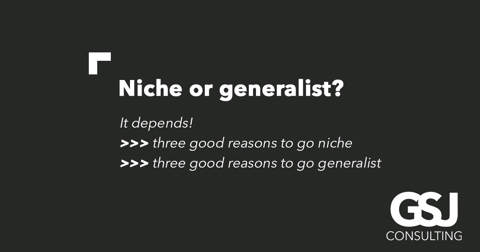Niche or generalist?

As experienced business development and client acquisition experts, probably one of the most common questions we get asked is whether clients hire the firm or the individual?
Closely following, though, is whether it is better to be a generalist, full-service practitioner or a niche practitioner.
And, as is the case with so many things in professional services, our answer to that question is a cop-out: "it depends".
But, in fairness, it really does depend.
So here is a quick look at 3 reasons why you might want to be a niche practitioner as compared to 3 reasons why you might want to be a generalist/full-service practitioner.
3 reasons to be a niche practitioner
-
Specialisation
There is a lot to be said for specialising. Being known as a true Subject Matter Expert (SME) allows you to easily differentiate your services from any of your competitors and, with it, you can charge a premium for your advice.
By way of example, if you are seen as being the market leading health and safety expert, you won't need to tender for much work - and that should allow you to charge more!
-
Less competition
When you niche down you should find that there is less competition. Google becomes your friend as it is easier to find you in the crowd.
Again, with less competition should come less commoditisation and high fee premiums.
-
Reputation
Once you become known as an SME, your reputation proceeds you, and it becomes much easier to get referral work from your network, which - again – should lead to more opportunities to charge higher rates.
3 reasons to be a generalist/full-service practitioner
-
Diversify the risk
Being a generalist practitioner allows you to diversify the risk in your practice. This can be a really important consideration if the area you practice in is subject to economic or legislative change.
Economic cycles can make it hard for certain practitioners to get work when the economy goes into a downturn - mergers and acquisitions for example. Likewise, other areas, such as planning and environment, can be influenced by the political party in power at that time.
Both of these issues could be mitigated by working more as a full-service practitioner that has expertise which is economically counter-cyclical – i.e., when one area is down, the other area of expertise is up (or at the very least, neutral).
-
Variety of work
As a generalist practitioner, you will get a variety of work. You will not be doing the same thing day in, day out. This will allow you to stay fresh and interested in what you are doing.
And this is an important consideration given most of us will now be working for about 50 to 60 years of our lives!
-
Opportunities
Wearing multiple hats as a generalist practitioner should provide you with more opportunities to find work.
This will help you sleep better at night, and there is a lot to be said for sleeping better at night!
At the end of the day, deciding on whether you want to be a niche provider or generalist/full-service provider should align with your strategy goals, where you see market demand (short, medium and long-term), and ultimately your personal preferences.
Looking for more business development and strategy insights?
You may want to read:
Contact GSJ Consulting
We can help you Aquire, Retain, Grow
The information contained in this article is of general nature and should not be construed as professional advice. If you require further information, advice or assistance for your specific circumstances, please contact us.
